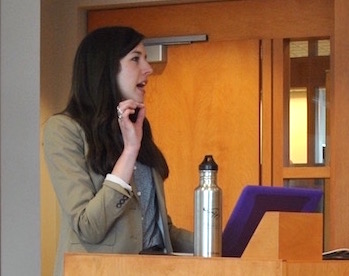 Deborah Hemming knows a lot about uniting people with the information they need, whether it's what makes researchers want to share their data, or how to find a new audience for a classic book. She's also one of the few people you'll hear describe writing her thesis every day as "a real treat." But she's always been at home in an academic environment. After earning an MA in English from McGill University and working as a freelance writer in Montreal, she came back home to Halifax to study for a Master of Library and Information Studies (MLIS) degree at Dal, drawn by the small program size, which she says fosters a "supportive and highly collaborative community."
Deborah Hemming knows a lot about uniting people with the information they need, whether it's what makes researchers want to share their data, or how to find a new audience for a classic book. She's also one of the few people you'll hear describe writing her thesis every day as "a real treat." But she's always been at home in an academic environment. After earning an MA in English from McGill University and working as a freelance writer in Montreal, she came back home to Halifax to study for a Master of Library and Information Studies (MLIS) degree at Dal, drawn by the small program size, which she says fosters a "supportive and highly collaborative community."
Hemming's ambition is to be an academic librarian, and her time at SIM gave her a chance to work in two different university libraries. For her practicum, she worked at the Vaughan Memorial Library at Acadia University, where she got to see the inner workings up close: "attending meetings, talking to librarians and library staff, and working on interesting projects."
She also did an internship at Dal's Killam Library, where she worked at the reference desk, created instructional content for the website, led orientation sessions and worked on assessment projects to help better understand library users' needs. She also enjoyed making themed book displays. Her favourite was "Blind Date With a Book," which promoted the library's fiction collection and helped match readers with books they might not have considered otherwise. Hemming and her colleagues wrapped classic books such as The Great Gatsby, Anne of Green Gables and newer ones like The Silent Wife by A.S.A. Harrison in brown paper and wrote "dating profiles" describing each without revealing the name or author. "It was a real highlight," she says, noting that it prompted some students to register their library card for the first time. "That in particular was very rewarding."
A desire to understand what motivates researchers to share information—and what makes them reluctant to—led Hemming to do a thesis focused on collaboration in research networks. In conducting her research, Hemming talked to biologists, geographers and oceanographers from across Canada about a national network for sharing ocean data currently in development. "The researchers I spoke with were so generous with their time; it was great to be able to have in-depth conversations with them about the issues," she says. She discovered that ocean researchers derive great value from online collaboration, and believe that "data sharing is essential to their research." However, a poor user experience can make them less likely to share: "any systems used for data sharing must be intuitive and user friendly for collaboration to be successful."
After graduation, she's looking forward to finishing a novel she's working on, "a coming-of-age story about wine and friendship, set in Nova Scotia's Gaspereau Valley." She'll be looking for work in an academic library, where she'll be able to continue helping books find their readers and researchers find their peers. As is common in information management, the technology and users’ needs change so fast that she doesn't know exactly what the job will look like in the future, but she's ready for anything. "That’s what I like most about this field—it’s always changing!”
Recent News
- MLIS alumna wins 2023 RBC/PEN Canada’s New Voices Award
- Job Postings: Part‑Time Academics (Fall 2023)
- Charlie Hook (MI ’23) on her upcoming PhD Program at the University of Leicester
- Alison Brown Featured in 2023 Dalhousie ‘Open Think’ Initiative
- Job Posting: Part‑Time Academics (Summer 2023)
- MLIS Graduate Chosen as 2023 Black Changemaker
- Dal SIM Appoints Two New Professors Emeriti
- Dr. Colin Conrad on his new role as Interim Director (Master of Digital Innovation)
